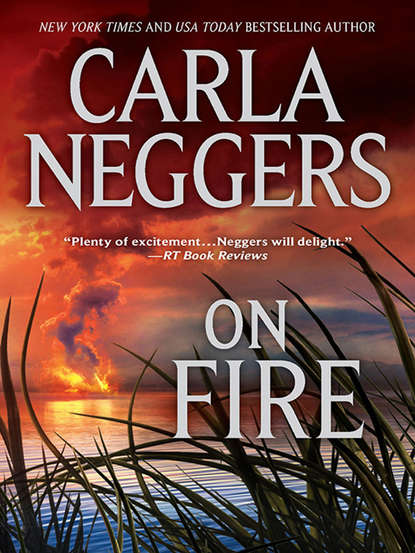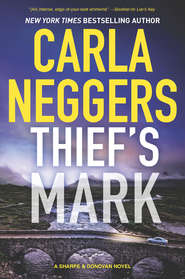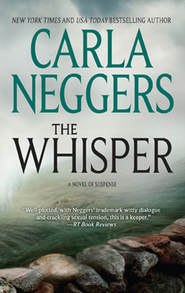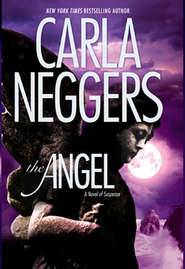По всем вопросам обращайтесь на: info@litportal.ru
(©) 2003-2025.
✖
On Fire
Автор
Год написания книги
2018
Настройки чтения
Размер шрифта
Высота строк
Поля
The PTSD volunteers, she knew, stayed in the bowels of the center, away from any hint of crowds. But she didn’t see Straker there, either. Maybe his clam chowder had arrived. Riley had no desire to disturb the rest of the group’s lunch. With a huff of exasperation, she stormed outside to collect her wits before she ventured up to see Henry.
A stiff breeze gusted off Boston Harbor, bringing with it the feel of autumn. She wanted to be out on the water now, in her kayak, paddling with the wind. Just imagining it helped calm her.
Straker materialized at her side, his impact like a hot gust. “Nice fountain. Dolphins, whales, otters, seals. I like the walrus, myself. A fountain with a sense of humor, which is more than I can say about most of the people who work here. You’re an intense group.”
“What did I do to deserve you on my case?”
His gaze cooled. “You found a dead body on my island.”
“I thought you were having lunch with your PTSD friends.”
“It was yuppie clam chowder. Now, a good haddock chowder with a pat of butter and a sprinkle of black pepper—that would have had me.” He laid on his downeast accent, but Riley could see the tightness in his jaw, the hint of tension in his eyes. They were good eyes. Alert, expressive, as cool and impenetrable a gray as a Maine fog. She shook off the image, wondering what had got hold of her. He went on, “I expect I owe Abigail Granger an apology.”
“For what?”
“I was pretty much a jerk to her. I lied, and I put her on the spot.”
“You’ve never apologized before for being a jerk.”
He scowled. “You’re smart, Riley. But you’re not sweet.” He started off without a word.
“You aren’t really going to apologize to Abigail, are you?”
“I might.” He glanced back at her, a spark of humor lighting his face. “You know, she’s a hell of a lot nicer than you are.”
“Sam Cassain stopped in to see the Grangers on Friday,” Riley blurted.
He stopped. She could see his FBI-trained mind clicking into gear. This wasn’t the mind she knew. She knew the mind that wanted to drown her. She had to remember this wasn’t the boy she’d known on Schoodic Peninsula.
“On Mount Desert?” he asked.
He said it, dessert, the way the locals did, as in the French Mont Desert, or barren mountain, for its hills of pink granite. She nodded. “Abigail told me.”
“Where did Cassain live? What’s he been doing the past year?”
“Last I heard he was working on the docks in Portland, but he still had his place down here—out in Arlington, I think. He hadn’t settled into a new job, so far as I know.”
Straker continued on his way without comment. Riley sighed. The man could drive her to the brink if she let him. She turned back to the fountain. More people had drifted over for a bit of fresh air during their lunch hour. Suddenly the idea of going back to work, trying to concentrate, didn’t appeal to her. She was restless, frustrated, still absorbing the potential ramifications of Sam Cassain turning up dead on Labreque Island. She wanted to find Emile—and she wanted to know what Straker was up to next.
“Riley? I thought that was you.”
Hell, she thought. Henry Armistead. He’d got to her before she could get to him. From his grim expression, she guessed he’d heard the news. Bennett had lured him east from California three years before to serve as the center’s executive director. He was fifty-one, handsome and polished, and Riley, oblivious to such things herself, had heard rumors of a budding relationship between him and Abigail Granger.
“I was just coming to see you,” she said lamely.
“A little late, I’d say. Maine State Police investigators are on their way. They want to talk to Abigail, Caroline Granger, your father and me about Sam’s death. They said they might want to ask you a few more questions, too.”
She nodded. “I understand.”
“I wish I’d known about this before the police called.”
“You’re right. I’m sorry. I’ve been preoccupied.” She stopped, picturing the body lying facedown in low tide. “I didn’t recognize him. It never occurred to me…”
“It must have been a terrible moment for you,” Henry said softly. “Riley, Sam’s body turning up on an island your grandfather owns…” He inhaled. He was gray haired, formal in his dark gray suit. His dress and manner, his sensibilities, fit with the Grangers more than they did the Labreques and St. Joes. “I can only imagine what the police must be thinking.”
“We shouldn’t jump to any conclusions just because there was bad blood between Emile and Sam. For all we know, Sam could have been on his way to tell Emile he’d changed his mind about the Encounter and wanted to mend fences. There’s just no telling.”
“I know Emile’s your grandfather, but…” He sighed. “Well, never mind. It’s obvious you have a blind spot where he’s concerned, which is understandable. I just hope Emile hears the news that the police want to talk to him, and comes in.”
“I’m sure he will. This isn’t the first time he’s taken off without telling anyone. Since he’s retired, he doesn’t have to answer to any of us.”
Henry tilted his head back slightly and gave her a long look, the kind that reminded her who was boss and who wasn’t. “That’s true. He doesn’t. But you, Riley—I want to make sure your priorities and obligations are clear.”
“Of course they are.”
He looked dubious. “Your sister is estranged from Matthew Granger. Sam Cassain placed responsibility for the deaths of five people, including Bennett Granger, on your grandfather’s shoulders. Now he’s dead and Emile’s disappeared.”
“I was there, Henry.” She kept her voice low, under control. “I know what happened.”
“Perhaps you should take the afternoon off,” he continued more gently. “We can see where things stand in the morning. With any luck, this will all have sorted itself out by then.”
Riley stood rock-still, not certain where this was leading. “Henry, I have work to do. Is this a suggestion or a request?”
“You’ve been walking the razor’s edge for a year. I know it’s difficult for you to accept Emile’s culpability with regard to the Encounter. It’s difficult for all of us. I’m being very straightforward with you, Riley. You’re not neutral. If you were, you wouldn’t have been on Labreque Island in the first place.”
“I took a vacation day and kayaked over for a picnic. It’s not as if—”
He held up a hand, stopping her. “I know, I know. I’m not criticizing you. You’re in a difficult position. I ask you to keep in mind how important the Grangers are to this institution. Bennett’s death and the Encounter controversy were tough blows to absorb. I’m not sure what else that family can stand before they turn their attentions elsewhere.”
And their money, Riley thought bitterly.
It was as if Henry read her mind. “It’s not just their financial support we can’t afford to lose. It’s their enthusiasm, their passion for the center’s work.”
“Abigail’s, you mean. Caroline doesn’t seem that interested in oceanography, and Matt—”
“Take the afternoon off,” Henry interrupted sharply. “And take tomorrow off if you need to.”
She nodded. Her throat was tight, dry, her voice strangled. If Henry knew about Straker and his shark-feeding, he’d probably fire her. He’d only worked at the center for three years. He didn’t understand the connections between her family and the Grangers, that losing Bennett Granger was tantamount to losing a second grandfather.
“What about the dinner tonight?” she asked.
He winced, obviously having forgotten Abigail’s bimonthly dinner for the center’s staff. “You’ll have to attend, I suppose. It would be awkward and obvious if you didn’t. Abigail understands your torn loyalties. We all know you were nearly killed on the Encounter yourself.”
“So was Emile.”
“Emile doesn’t place the same value on human life that the rest of us do. That’s the problem. That’s what led to the Encounter disaster. We all see it, Riley, even if you can’t.” Henry straightened, squaring his shoulders as if he knew he’d gone too far. “Well, I’ve been as brutally honest as I can be. Forgive me. I’ll see you this evening.”
He started out across the plaza, and Riley shook her arms and hands to loosen up the tensed muscles. Was she that blind to Emile’s faults? Her mother, her father, her sister, her boss—everyone believed his passion and dedication to his work had turned pathological. She was his last defender.











